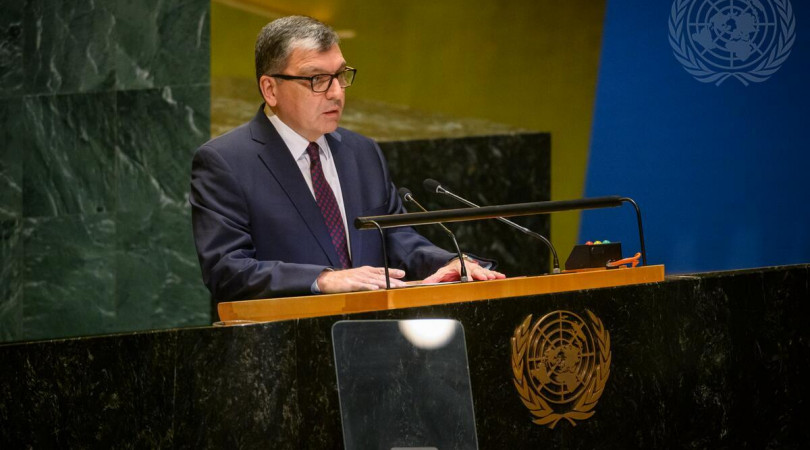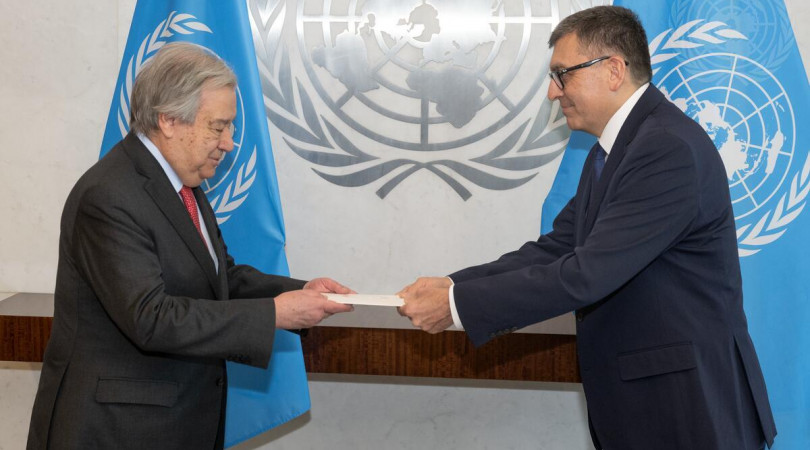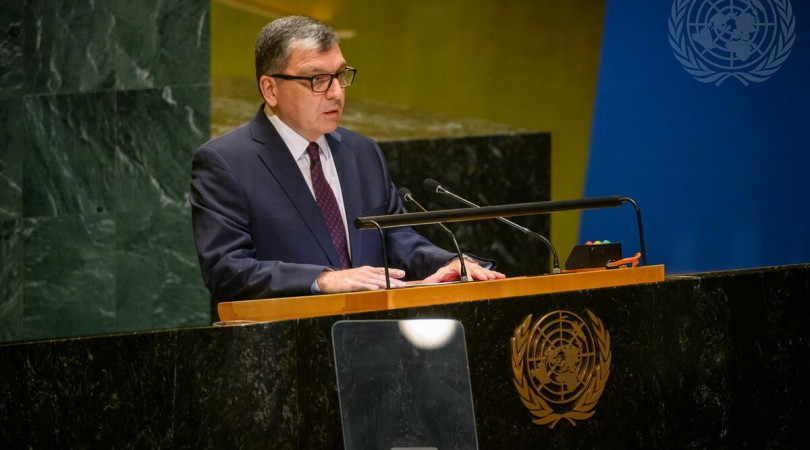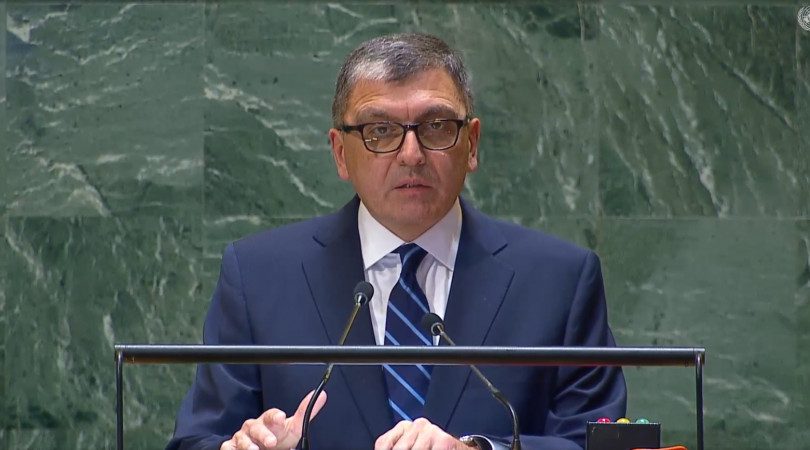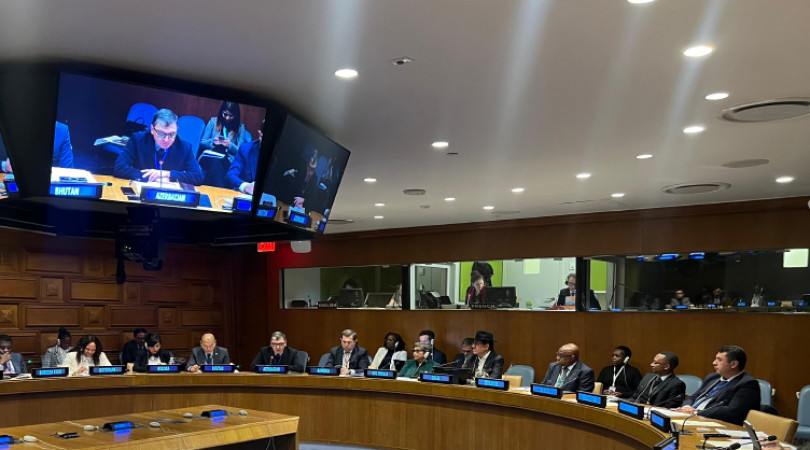Ilham Aliyev attended the opening of the 6th Baku International Humanitarian Forum
The 6th Baku International Humanitarian Forum has kicked off at the Heydar Aliyev Center.
President of the Republic of Azerbaijan Ilham Aliyev, first lady Mehriban Aliyeva and vice-president of the Heydar Aliyev Foundation Leyla Aliyeva attended the official opening ceremony of the Forum.
The Forum was held under the slogan “Shaping a New World and a New Humanity: Creativity and Human Development”.
The head of state addressed the opening ceremony of the Forum.
Speech of President Ilham Aliyev
- Dear ladies and gentlemen,
Distinguished guests!
The 6th Baku International Humanitarian Forum starts today. Let me sincerely greet all the participants of the Forum and welcome our foreign guests.
Over 400 foreign guests from over 90 countries are taking part in this forum. This is evidence of a great interest in the Forum around the world. Over a short period of time, the Baku International Humanitarian Forum has become a very important international event in the world. I am sure that the issues that to be discussed at the Forum will be important for further expanding our humanitarian cooperation and that foreign guests will make a great contribution to the Forum.
The discussion of humanitarian issues is very important because we see both achievements and problems in this area in the modern world. Azerbaijan is a country attaching great importance to this sphere. Numerous international humanitarian cooperation events have been held in our country. Among them I want to highlight the UN Global Alliance of Civilizations Forum. This is a very important international platform. The Summit of Religious Leaders of the World was also held in Baku. The Forum on Intercultural Dialogue has been held here four times. The sixth Baku International Humanitarian Forum shows that Azerbaijan has indeed become a very important contributor to the deepening of international humanitarian cooperation.
This year we are celebrating the 10th anniversary of the Baku process. The Baku process is highly regarded by international organizations, including the UN which gives a very high assessment to this process. On our initiative, the ministers of culture of the countries participating in the Organization of Islamic Cooperation were invited to the meeting of culture ministers of the Council of Europe member-states in Baku 10 years ago. Thus, representatives from more than 100 countries, officials representing the Muslim world and Europe, met and discussed humanitarian issues, cultural ties and interreligious relations for the first time. A year later, this format was repeated, as we invited representatives of Europe to an event held in Baku through the Organization of Islamic Cooperation.
Azerbaijan is a member of both the Organization of Islamic Cooperation and the Council of Europe. Of course, using these opportunities, we have tried to contribute to the inter-civilizational dialogue. As I have already noted, the Baku process is evaluated on an international scale as a very important initiative. Thanks to this initiative, various meetings and activities have been held serving the goal of deepening and strengthening the inter-civilizational and inter-religious dialogue, reducing risks around the world, giving a correct assessment to cases of discrimination and xenophobia, and stopping these dangerous trends. In addition, the prestigious sporting competitions held in Azerbaijan, despite being sporting competitions, have also served to deepen humanitarian cooperation. I would like to highlight the first European Games and the Games of Islamic Solidarity. I believe it is quite symbolic that the first European Games were held in Azerbaijan on our initiative. I think it is a remarkable event and a remarkable decision to hold the first European Games in a Muslim country. Two years later, in 2017, Baku hosted the fourth Islamic Solidarity Games. I want to note again that these were sporting events, and about 10,000 athletes took part in the games. But at the same time, we view these games through the prism of humanitarian cooperation, and I really believe that the wonderful atmosphere, the wonderful climate of solidarity that prevailed in Baku and other regions during the games became another contribution to our common cause. We will continue our activities in this area, especially in the present circumstances when, I want to say again, the processes related to multiculturalism and Islamic solidarity taking place both in the Muslim world and in Europe are causing concern. Therefore, the traditional nature of the Baku International Humanitarian Forum, the high assessment the world community is giving to this Forum and the attention being paid to it are evidence that there is a great need for such events in the world.
Representatives of various religions and nations lived in Azerbaijan like one family in the conditions of peace, friendship and tranquility for centuries, and this policy continues today. Our state policy in this direction is very effective and leads to excellent results. Our historical past and culture show that representatives of various religions have always lived peacefully like one family in Azerbaijan. Our historical and religious monuments speak volumes about our ancient history and show that Azerbaijan was a native land and a native place for representatives of various religions. We are proud that one of the oldest mosques of the Muslim world, the mosque built in the city of Shamakhi in 743, is our national treasure. At the same time, one of the most ancient churches of the Caucasus, a church of Caucasian Albania, is located near another ancient Azerbaijani city, the city of Sheki. Both of these temples have been refurbished and restored and are being protected by the state. An ancient temple of fire worshipers, Atashgah, is located in Baku. This indicates that the traditions of Zoroastrianism exist in Azerbaijan.
The restoration and construction of temples of traditional religions, Catholic and Orthodox churches and synagogues, are a reality in Azerbaijan. This reality creates an excellent public setting in our country. Multiculturalism is a state policy in Azerbaijan. We are very attached to our national and religious traditions, we are committed to them, our national values play a special role in our future development. I can say that the modern Azerbaijani state rests on deep national values, national and spiritual values. At the same time, we are open to the world. As I have already noted, Azerbaijan has become one of the centers of multiculturalism in the world, and this honorary status is already recognized by the world community. It is no coincidence that by my Order we declared 2016 a Year of Multiculturalism in Azerbaijan. I believe that such an initiative was the first of its kind in the world. This demonstrates our intentions. Having declared 2016 a Year of Multiculturalism, we, first of all, wanted to introduce Azerbaijan to the world the way it is. We wanted to show that multiculturalism in Azerbaijan is both a state policy and a way of life. At the same time, we tried to attract the attention of the world community to this issue because, as you are also well aware, politicians, public figures and the media today are voicing rather contradictory thoughts regarding multiculturalism. Therefore, I believe that there is a need for a unified approach to this issue. There can be no contradictory thoughts here. I think that the experience of Azerbaijan in this field is commendable and can serve as a good example. We are seeing the fruition of multiculturalism in everyday life. The stability, civil and national accord existing in Azerbaijan today are based, among other things, on these values. In 2016, we tried to draw attention to this important issue, especially, let me reiterate this, if we consider that there are different thoughts in connection with multiculturalism. I believe that this issue will be widely discussed at the Forum.
We declared 2017 a Year of Islamic Solidarity. And again – because Islamic solidarity is fully established in Azerbaijan. I should also note that the Muslims of Azerbaijan are performing the Namaz of unity. I believe that Azerbaijan plays a very important role in this area in the Muslim world. At the same time, we tried to draw the attention of the Muslim world to this area, because, unfortunately, we were unable to achieve what we wanted on the issue of solidarity in the Muslim world. The confrontations, wars, misunderstandings, clashes and other dangerous trends are turning into a major problem and tragedies for countries. Millions of people die, are left homeless, turn into refugees and migrants. Of course, we should try to make our proposals, set an example in this area because if the concepts of “Islamic solidarity” and “multiculturalism” constitute a unity and the state policy is carried out correctly and is accepted by the people, then there will be no problems left in the countries. Modern Azerbaijan is a clear and vivid example. It is no coincidence that we are hosting numerous activities related to humanitarian cooperation and multiculturalism.
As I have already noted, we attach great importance to humanitarian cooperation. These issues are always on the agenda – both in a bilateral format with friendly countries and within the framework of international organizations. At the same time, we ourselves are faced with a major humanitarian disaster. A week ago, on 18 October, we celebrated the 27th anniversary of the restoration of the state independence of Azerbaijan. Azerbaijan has been an independent country for only 27 years, and the first days and first years of our independence were very difficult and tragic. The political crisis, internal strife, civil war, economic recession, public disobedience, as well as the aggressive policy pursued by Armenia against Azerbaijan, led to great disasters and hardships. As a result of Armenia’s aggressive policy, 20 per cent of our land is under occupation. Armenia has conducted a policy of ethnic cleansing against our people, more than a million Azerbaijanis have become displaced in their native land. All leading international organizations have adopted decisions and resolutions in connection with this conflict, including the UN Security Council which has adopted four resolutions. These resolutions explicitly state that Armenian armed forces must immediately and unconditionally withdraw from the occupied lands. Twenty-five years have passed since the adoption of these resolutions. Armenia does not comply with them. Unfortunately, there is still no international mechanism that would force the aggressor to implement the resolutions adopted by the leading international organization. A similar resolution has been adopted by the UN General Assembly. The decisions and resolutions adopted by other international organizations, including the Non-Aligned Movement, the Organization of Islamic Cooperation, the Parliamentary Assembly of the Council of Europe, the European Parliament and others, express support for a settlement of the conflict within the territorial integrity of Azerbaijan. This is the only way of resolving the conflict: the territorial integrity of our country recognized by the international community must be restored, the occupying forces must immediately and unconditionally withdraw from our lands, as indicated in the resolutions of the UN Security Council, and the citizens of Azerbaijan must return to their homes and ancestral lands.
Nagorno-Karabakh is our historical and native land, an integral part of Azerbaijan. The Azerbaijani people have lived, created and built on these lands for centuries. Our historical monuments, place names of cities and villages show that these lands belong to the Azerbaijani people. Unfortunately, the aggressor state has destroyed our historical and religious monuments on the occupied lands. The OSCE Fact-Finding and Observation Mission sent to our occupied lands twice confirmed this in its reports. Our mosques and graves have been destroyed, museums have been looted, and an act of cultural genocide has been committed on the occupied lands. In 1992, the Armenians perpetrated the Khojaly genocide. As a result of this heinous war crime, more than 600 innocent civilians, including more than 60 children, were brutally murdered. The Khojaly tragedy is officially recognized as an act of genocide by more than 10 countries of the world. During this genocide, more than a thousand people went missing and nothing is known about their fate.
The Armenia-Azerbaijan Nagorno-Karabakh conflict must be resolved on the basis of the norms and principles of international law. Azerbaijan will never come to terms with this occupation and the territorial integrity of our country must be restored. This is required by historical justice and international law.
Despite this humanitarian catastrophe, I believe that Azerbaijan managed to achieve very successful development in the years of independence. Stability and security prevail in our country. The source of stability is the will of the Azerbaijani people. The civil accord existing in Azerbaijan today is the main prerequisite for the successful development of our country. Our country has earned great international respect and the number of countries cooperating with us is growing every day. Exactly seven years ago, at the end of October 2011, Azerbaijan was for the first time elected as a nonpermanent member of the UN Security Council. This is our great political and diplomatic success and victory. Most importantly, 155 countries supported the candidacy of Azerbaijan. In other words, it shows that the vast majority of the world community supports Azerbaijan, appreciates the work being we are doing in Azerbaijan and considers Azerbaijan a reliable partner and a friendly country.
I believe that the foreign policy work we are doing yields excellent results. First of all, we have succeeded in establishing very sincere, good-neighborly and friendly relations with neighboring countries. The relations with neighbors are of particular importance for any country. I am pleased to note that our relations with neighboring states, of course, with the exception of Armenia, are at a very high level in the political, economic and all other areas, including the field of humanitarian cooperation.
All fundamental freedoms, including the freedom of speech, the freedom of assembly, the freedom of the press and the freedom of conscience, are guaranteed in Azerbaijan. More than 80 per cent of the Azerbaijan population uses the Internet. There is free internet in our country. Thus, the deepening political reforms are giving an even greater impetus to economic reforms in our country because stability has created excellent conditions for attracting large foreign investments into Azerbaijan. In terms of investment per capita, Azerbaijan is in one of the leading places on a global scale. I should note that over 250 billion dollars have been invested in our economy, and half of that is foreign investment.
Over the past 15 years, Azerbaijan has demonstrated the highest rates of economic development. I believe that this is a record figure, because over the past 15 years the gross domestic product has increased 3.2 times. Azerbaijan has covered a long road of development. We have gained complete independence in the economic sphere. Of course, economic independence strengthens our political independence. The economy of Azerbaijan is self-sufficient. We do not depend on foreign loans. Not only have we stopped receiving loans, we have also started to give loans to other countries.
Macroeconomic stability in Azerbaijan is at a very high level. I must say that our foreign debt accounts for only 20 per cent of the gross domestic product. At the same time, our financial resources exceed our external debt four to five times. In other words, if we wish, we can reduce our external debt to zero within a few months. Therefore, the fundamental reforms carried out in the economic sphere, of course, have had a positive impact on the social sphere. If you look at important areas of the social sphere, you can see that the number of people living in poverty in Azerbaijan has decreased from 49 to 5.4 per cent over the past 15 years. Unemployment as a social problem has practically been eliminated - it is at the level of 5 per cent. It should be noted that our population is also growing - by at least 100,000 people every year. Therefore, our economic development, including the creation of social infrastructure, should be a permanent process. We have done a lot in this direction.
One of the issues to be discussed at the Forum is related to education. I can say that the development of education and the application of modern educational methods is one of our top priorities. The material and technical infrastructure of the education system is being strengthened. Over the past 15 years, more than 3,000 schools have been built and repaired. I must say that there are more than 4,500 schools in Azerbaijan, and the overwhelming majority of them are built at the highest standards. At the same time, interest in the teacher's profession has significantly increased. As a result of the reforms carried out, including a significant increase in salaries, renovation of schools and other steps, the number of those who want to become teachers has increased significantly, and this year we have witnessed this. Among the most successful applicants to university this year, the number of those interested in becoming teachers has increased several times. This shows that a lot of attention is being paid to education, which is one of the key components of the humanitarian sphere, and there are excellent results.
There are modern medical centers throughout our country. Over the past 15 years, more than 650 medical institutions have been renovated, overhauled and built. Every year, more than 5 million people undergo free medical examination at the expense of the state. So it is a very important part of the humanitarian sphere. A consistent policy in these areas will be continued.
I have mentioned sporting events. I must also say that great successes have also been achieved in sports. We have created a strong material and technical infrastructure of sports not only in Baku, but also in other cities of Azerbaijan. Forty-five modern Olympic centers have been built. In the last Olympic Games in Rio de Janeiro, Azerbaijan finished in 14th place in the world in terms of the number of medals.
By pursuing a consistent policy, we are both deepening economic reforms and taking the necessary steps in the social sphere. Our country pays great attention to high technology. We have recently put our third satellite into orbit. For several years now, Azerbaijan has been a member of the small club of space-faring nations – we have three satellites. Of course, this means technological development, education, and business opportunities. By exporting satellite services today, we also diversify our country’s exports.
The creation of the “ASAN xidmət” centers is a very important initiative in the social and humanitarian sphere. If guests have the opportunity, they can visit one of the five centers operating in the city of Baku. They can see how “ASAN xidmət” functions, which is really an intellectual product of Azerbaijan and is based on Azerbaijani technologies. This year, the number of centers will be increased to 15, five in Baku and 10 in the regions. In these centers, more than 300 services are provided in the same building. Public approval ratings of “ASAN xidmət” are close to 100 per cent. This created a kind of a revolution in public services. They have put an end to cases of bureaucracy, red tape, corruption and bribery typical of public services. In a matter of a few years, more than 24 million applications have been made to “ASAN xidmət” centers, and the absolute majority of them were granted.
I can talk about Azerbaijan for a long time because some of the guests are visiting our country for the first time. Concluding my statement, I want to bring to your attention another issue. It deepens humanitarian cooperation and also ensures mutual interests. I believe that when we speak about humanitarian cooperation, we must see its excellent results and know what it will lead to.
The last topic is related to our transport policy. Azerbaijan has an advantageous geographical location, but this geographical location doesn’t mean much without a modern infrastructure. On the other hand, Azerbaijan has no access to the world ocean. Therefore, all our transport, energy and communication lines must pass through the territory of other countries. Of course, as I have already noted, in order to achieve this, we must have close and friendly relations with neighboring states and countries, and we have that. Several years ago, we set the task of turning Azerbaijan into a powerful transport center not only in the region but also on a global scale. We began to consistently move towards this goal, and I can say with full confidence today that we have managed to achieve this. A modern transport infrastructure has been created in our country – six international airports, railways connecting Azerbaijan with all neighboring countries and covering the main part of our country, more than 15,000 kilometers of roads built over the past 15 years, the largest fleet of more than 200 ships in the Caspian Sea basin. So all of these are projects requiring major funds, and they have been implemented. Finally, all this work is complemented by the commissioning of a new important trade seaport on the Caspian Sea. Today, the East-West and North-South transport corridors pass through the territory of Azerbaijan. The activity of the North-South transport corridor has expanded further. Compared to last year, 100 times more cargo was transported through this corridor this year. And this is only a beginning. Today, other directions are connecting to these two important areas. We are already providing the South-West transport corridor. The East-West transport corridor also passes through the territory of Azerbaijan. Azerbaijan is the only country participating in all these transport and infrastructure projects. This transport link also creates an excellent basis for good neighborly relations. Without good relations with neighbors, no country can ever become a reliable transit link. Therefore, our energy, transport and infrastructure projects stimulate cooperation among countries. In order to deepen cooperation between countries, it is necessary to attach great importance to the humanitarian sphere, especially the relations with neighboring countries, traditionally friendly countries. Without this, problems can arise in all other areas.
Therefore, I want to note again that we are paying great attention to humanitarian cooperation. We have come up with many initiatives. The Baku International Humanitarian Forum starting today is one of them. I am sure that these discussions will make an excellent contribution to our common cause.
I welcome the participants of the Forum again and wish you all success. Thank you.
©President.az

